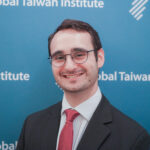This co-authored article offers a dual perspective on the Taiwan Studies Research Fellows Program, administered by the Taiwan Education and Research Program (TERP) at the George Washington University (GW). The first section, written by Richard J. Haddock, examines his experience as a program administrator. The second section, written by Ben Levine, highlights how the program supported his academic and professional growth, offering a firsthand account of its value to early-career scholars.
An Administrator’s Perspective on the Taiwan Studies Research Fellows Program
Good policies do not craft themselves—people do. We rely on experts to conduct rigorous research, design thoughtful frameworks, and implement solutions that are responsive to communities’ histories, positions, and evolving needs. As a result, we need people who are equipped to navigate the intricate sociopolitical, economic, and security dimensions of policymaking, and to assess outcomes with critical insight. At every stage—research, implementation, and evaluation—academia plays a foundational role in training future policymakers and leaders, preparing them not only to make policy, but also to shape a world that can be sensitive, open and strong.
Institutions of higher education play a critical role in shaping the next generation of policymakers by equipping students with the analytical tools, historical knowledge, and cross-cultural competencies necessary to navigate complex global challenges. Central to this preparation are experiential learning opportunities—such as internships, scholarships, and fellowships—which offer students direct exposure to policymaking environments and bridge the gap between academic theory and real-world application. To be truly effective, policy learning must draw from a wide range of disciplines—including the arts, humanities, STEM fields, languages, and area studies—to ensure that future leaders are equipped with both the breadth and depth of understanding needed to address our most pressing issues today and tomorrow.
These programs foster not only technical proficiency, but also the ethical and strategic sensibilities essential for good governance. One of the most formative experiences in my professional development was my internship with the Public Diplomacy Section at the Taipei office of the American Institute in Taiwan (AIT). This opportunity allowed me to directly apply my academic training in Taiwan Studies toward advancing US policy goals and strengthening bilateral people-to-people ties. Through this experience, I came to understand the often-complex relationship between policy design and implementation—and how critical on-the-ground experience and area studies expertise are to effective policymaking. I also realized that many of the soft skills essential to organizational success—such as project management, team morale, intercultural communication, and navigating different work styles—are best learned not in classrooms, but in practice. This internship represented the most direct and meaningful convergence of my academic interests and career aspirations, and it remains the learning experience I reflect on most in my growth as a Taiwan affairs specialist. Yet, none of it would have been possible without the financial and institutional support of my undergraduate alma mater, the University of Central Florida. Fortunately, my story is not unique: around the world, colleges and universities continue to provide students with critical resources and opportunities that serve as stepping stones into meaningful careers in policy.
The imperative to establish and resource practical learning experiences is especially salient in the context of US-Taiwan relations—a multidimensional and historically dynamic relationship. US-Taiwan relations are increasingly central to regional and global stability, economic prosperity, technologic growth, and democratic deepening. There is a growing need for academic programs that promote rigorous study and critical engagement with Taiwan’s political system, society, and international position. In recent years, the field of Taiwan studies has gained meaningful traction across US higher education, with programs and centers emerging or expanding at US institutions—such as the University of Washington, University of California, Los Angeles, the University of Texas at Austin, and Stanford University. Furthermore, government efforts—such as the United States’ US-Taiwan Education Initiative and the Taiwanese Ministry of Education’s Taiwan Studies Project grants—have encouraged more institutional investment and educational exchange between both sides. These developments reflect the increasing scholarly momentum and greater recognition of Taiwan’s importance in global affairs and across academic disciplines. By investing in Taiwan-focused curricula, research initiatives, and student opportunities, academic institutions provide an invaluable service in fostering deeper understanding and policy fluency among future leaders. Such efforts not only contribute to more sophisticated and informed policymaking, but also support the broader socialization of Taiwan within US public discourse—an outcome essential for sustaining a resilient and constructive bilateral relationship.
In this context, the George Washington University (GW) has developed a rigorous and interdisciplinary Taiwan studies hub through its Taiwan Education and Research Program (TERP) at the Sigur Center for Asian Studies. Established in 2004, TERP supports comprehensive study and research on Taiwan’s history, arts and humanities, identities, democratization, international relations, and socio-economic development. The program’s backbone includes an ever-expanding suite of Taiwan-specific courses, a vibrant calendar of public events, a special collection of Taiwan materials (including dangwai [黨外] periodicals), and professional development opportunities for students interested in building careers in Taiwan affairs. With an approach that centers around the development of student resources, TERP has sought to generate a virtuous cycle: scholarships empower students to take Taiwan-focused coursework to build up their knowledge and competencies, which is then paired with experiential learning activities that provide students with opportunities to apply these skills in professional and research settings. This process is based on my own experience as an undergraduate research fellow on Taiwan affairs at the University of Central Florida’s Office of Global Perspectives and International Initiatives, following my experience studying abroad in Taiwan.
Policies need people, and our goal at GW is to be a leadership incubator for the next generation of Taiwan affairs policymakers. Central to this effort—and indeed to this special issue of the Global Taiwan Brief—is the Taiwan Studies Research Fellows Program. Now in its fourth year, the Fellows Program awards roughly three to four fellowships annually for undergraduate and graduate students to pursue Taiwan-focused research projects over the course of an academic year. Working with a faculty advisor throughout the year, each fellow crafts a project that could be presented at academic conferences, published in policy-oriented outlets, or used in other professional applications. The program has supported a wide breadth of research topics and disciplines: including US defense policy toward Taiwan, women’s rights and the history of comfort women in Taiwan, Taiwan’s democratization and digital governance, economic development, cross-Strait relations, cultural identity, and refugee protection policy. The program cultivates well-rounded researchers who can analyze Taiwan’s political, social, and strategic complexities—signaling GW’s commitment to nurturing policy fluency in students that is grounded in hands-on scholarship. Through this program, each cohort of fellows become indispensable contributors not just to the GW Taiwan Studies community, but also to the greater research and policymaking circles.
In that spirit, for this special issue of the Global Taiwan Brief, the Global Taiwan Institute (GTI) has partnered with TERP to invite current and past fellows to present their own research. These contributions reflect the diverse perspectives and analytical depth of a rising generation of scholars and practitioners, and highlight the expanding opportunities for new voices within the study of Taiwan’s domestic and international affairs.
A Former TERP Fellow’s Perspective
As a graduate student who had previously only written academic papers, the Taiwan Studies Research Fellows Program gave me invaluable experience researching and writing from a policy angle. With academic papers, it is expected that the reader of the paper already has some background knowledge, and the main purpose of the piece is to present evidence that backs up a scholarly, theoretical argument. However, with policy writing, background knowledge is not assumed, and the purpose of the piece is to provide practical and actionable solutions. This change in style, while subtle, is a major shift that dictates how to both research and write.
Instead of only searching for related evidence in a narrow way to prove that your argument has merit, the research focus in policy writing broadens to encompass the reasons behind the focus on a specific issue. In terms of writing, less emphasis is placed on proving that your central arguments are correct—and more emphasis is placed on why the subject matter is important, and what solutions would be of most relevance.
My TERP fellowship culminated in a policy memo describing how Taiwan could augment its defense policy to become more resilient, and how the United States could change its defense posture in the region to increase readiness. My experience as a fellow not only consisted of preparing a policy-oriented deliverable, but also included a presentation. After submitting the final policy memo, I was also given the opportunity to present my findings at a seminar hosted by TERP. Through the experience of presenting and defending my policy memo before an audience, I received critical feedback and also had to justify the decisions behind my research and writing method. Overall, the experience not only challenged me to think more critically and analytically about the choices that I had made, but also sharpened my argumentation and communication skills.
In addition to learning more about Taiwan’s defense policy and how the United States is preparing to combat any potential invasion scenario, immersing myself into these issues allowed me to gain deeper insight into the unique challenges that Taiwan faces on a daily basis. Motivated to learn more about Taiwan, I was introduced by one of my professors to the Huayu Enrichment Scholarship. This scholarship would allow me to gain first-hand experience living and studying in Taiwan at a Mandarin language center. I eagerly applied and after a few months, I was excited to learn that I had obtained the scholarship to study at National Chengchi University in Taipei for nine months.
Beyond looking at a computer screen and talking with subject matter experts in DC to learn about Taiwan, my time in Taiwan allowed me to gain deeper insights into Taiwanese society. Living there gave me the opportunity to observe everyday life, speak directly with locals, and experience how policy plays out on the ground. I traveled all around the country and these experiences deepened my understanding of Taiwan beyond the academic and policy frameworks I had previously encountered.
Upon returning to the United States and continuing my studies at GW, I wanted to continue my passion for Taiwan studies. GTI was a natural place for me to do this. I was given the opportunity to intern at the organization in Fall 2023. During my internship, I gained hands-on experience on Taiwan related policy issues. During my internship, I was able to publish two articles in the Global Taiwan Brief: one about the struggles of Taiwanese youth finding employment after graduation, and another about the outcomes and implications of the 2024 Taiwanese legislative elections. After graduation, I was fortunate enough to continue as a full-time staff member at GTI, where my research has focused primarily on Taiwan’s defense policy and various social, political, and economic issues in Taiwan. My TERP fellowship enabled this path and gave me the foundational skills to navigate complex research questions, collaborate with subject matter experts, and to think critically and uniquely about problems—all skills that I continue to use in my work today.
The main point: Robust policymaking begins with people—those trained to research, design, and implement policies grounded in historical, cultural, and strategic awareness. Academia plays a vital role in this process, particularly through experiential opportunities that bridge theory and practice. Nowhere is this more evident than in the growing field of Taiwan studies, where programs like GW’s Taiwan Education and Research Program are cultivating the next generation of leaders with the skills, insight, and fluency to shape the future of US–Taiwan relations.




